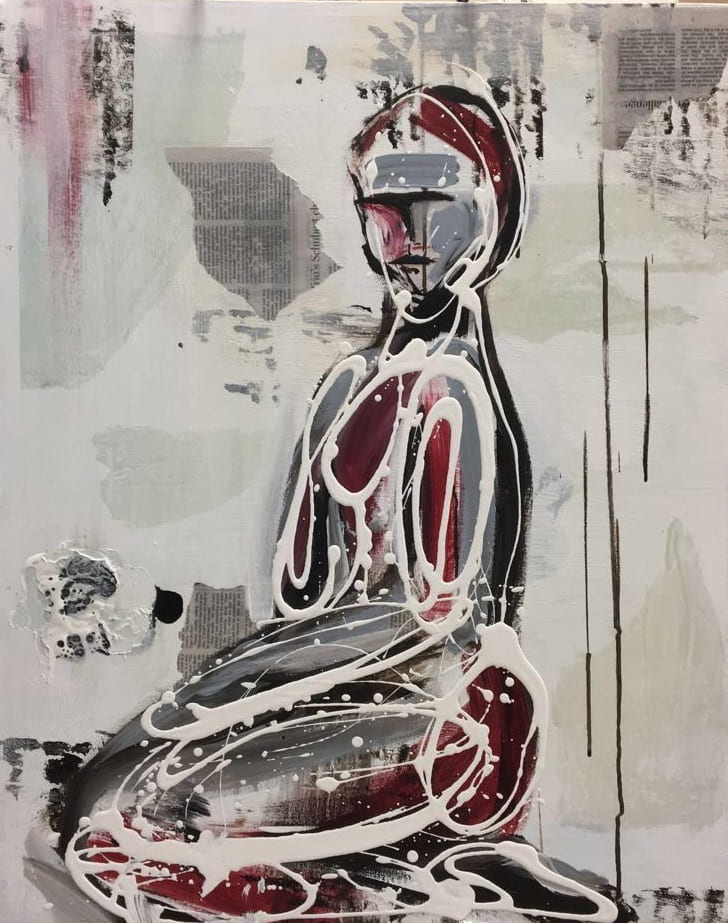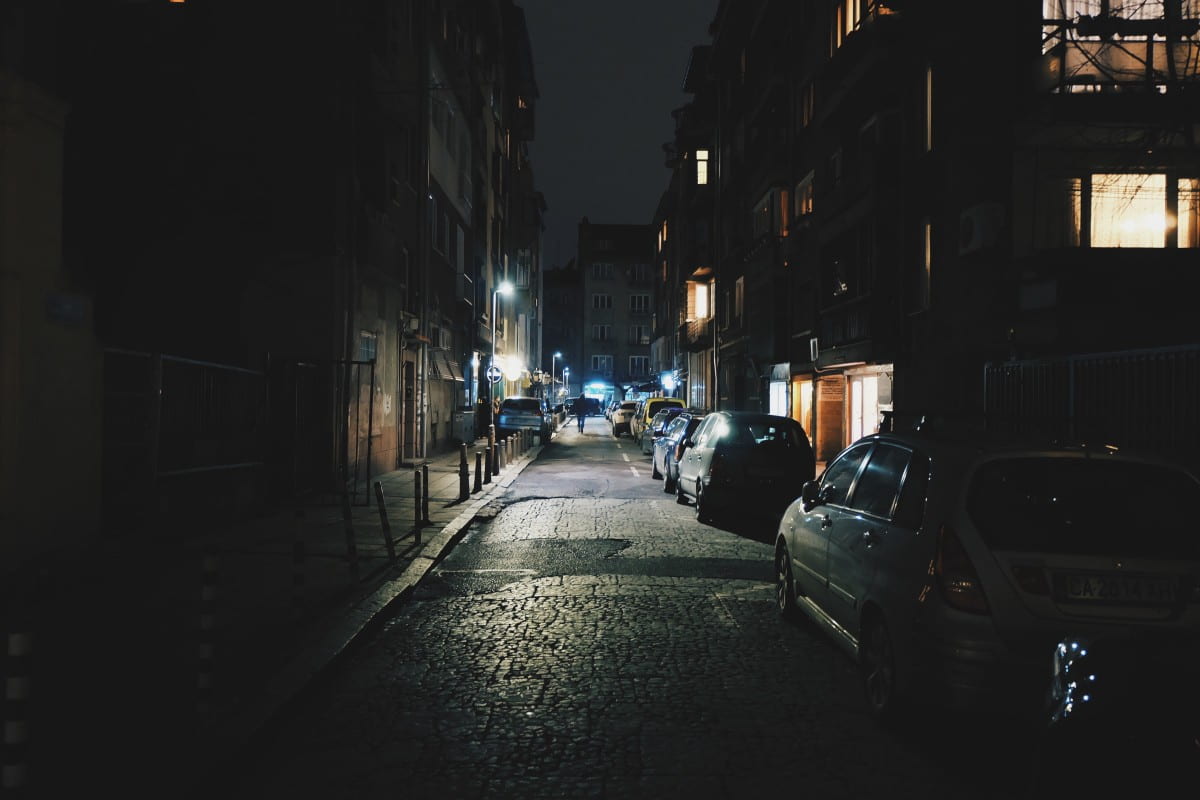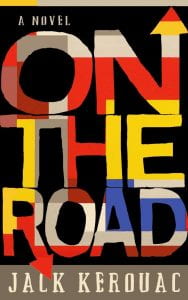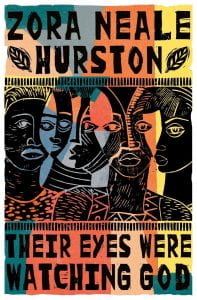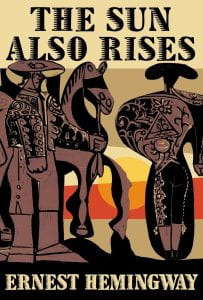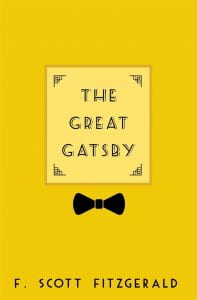I
On the train ride back to New Jersey, my wife Robin sits beside the window, looking into the screen of her phone, searching for information. Even though it is past midnight, she is not only stirred up by Don DeLillo’s appearance that night at the annual New Yorker festival but also trying to make sense of the mass shooting that occurred the day before at a community college in Oregon. The news and social media are buzzing with horror. It is all available on her phone, completely familiar and well-nigh routine by now—just another shooting—yet still unfathomable.
Robin and I are on our way back from a theatre on West 57th Street in New York City, where DeLillo gave a reading and answered questions from Deborah Treisman, fiction editor of The New Yorker, and from the audience. DeLillo is a writer who has imagined the assassin Lee Harvey Oswald in Libra and created a serial killer, the Texas Highway Killer, in Underworld. In short, he has written convincingly about desperate men who seek self-definition through violence. Thus, he was asked an obvious question: how do we make sense of Oregon?
As I try to sleep on the train, I’m grateful that no one too obnoxious is aboard. A group of people are returning from seeing a show, perhaps an opera. With arcane knowledge and appreciation, they talk about the voices, sounds, and music. They make comparisons to other performances, prior productions of the same show that they had seen in different cities. They are not a family, but a group of fans. They share an interest that is alien to me, and it is likely that none of them cares about the old man who brought Robin and me to the city. They are not loud or drunk, which is good. Robin and I are also quiet. We are not drunk, only feeling the mild, lazy hush that comes with fatigue and a few after-dinner drinks.
A recorded, metallic voice announces: “Next stop: Cranford.”
I look at Robin. She is a beautiful woman with dark hair and dark eyes. Taking little for granted, she questions the daily workings of society, the general hustle and flow, the accepted practices, and she asks herself, is this responsible, is this healthy, is this good? It is little wonder that she is a DeLillo fan. She pays attention to reports of gun violence in the news.
She asks, “What are you thinking about?”
“Nothing.”
“I feel tired. Don’t look at me.”
“You’re beautiful.”
“I’m tired. Go to sleep.”
I turn in my seat. I settle into a cozy idea about how loving someone and looking at that person can be joined in a single gesture, and how that gesture connects two people, molds them into ways of living and being. I’m thinking about DeLillo’s answer to the Oregon shooting: “The gun is the motive,” he says, and I’m thinking about love, not in a dreamy way, but more particularly, how it operates in the formation of the self. Our identities take shape within the gaze of someone else’s eyes.
I wonder about the audience for the desperate, lone gunman, giving shape to himself through violence.
It’s always a man.
“I hope someone posts a transcript of DeLillo’s talk. Or a video,” Robin says. “I keep thinking about what he said: ‘The gun is the motive.’”
“Me, too. It’s suggestive,” I say. “I’m not certain what he means.”
II
Not until several years before his death did I ever see my father cry. He would get weepy over trivial things, such as a memory of some family vacation, a compliment a colleague paid him decades earlier, a birthday card from a grandchild. One of his pills—or maybe the full cocktail of medications for his cancer, diabetes, cholesterol, and whatever else—caused him to become over sentimental at times. Ordinarily, he was tough and reserved. He was born during the Depression and raised in rural Appalachia. He found his way out of poverty by joining the army and going to Korea.
My father’s hunting shotgun was a Remington 1100. It seemed more special than the other guns in the house. The stock was decorated with fine engravings. The rubber buffer that absorbed the recoil looked painfully thin, which to me intimated the strength of his generation of men. His spare shotguns—Mossberg pump-actions, which my older brothers used—had an inch of rubber to protect your shoulder.
When I was very young, he sat on the couch while my brothers and I watched television. He opened an old, brown tin case that contained cotton pads, lubricant, and other items for caring for his gun. It was a very delicate procedure, he said, because the oils on your fingers could damage the metal. After a section was swabbed, it couldn’t be touched until the next time the gun was taken out. Whenever he rubbed the cotton along the barrel, it would come away greasy, blackened, and redolent with an odor that was uniquely its own: the smell of an oiled gun.
Behind our suburban home, my brothers set up a makeshift shooting range for our shared BB gun, an air-pump Daisy. From a picnic table on our back patio, we took aim at empty soda cans lined up along the redwood fence that bordered our garden. My father would coach, ensuring our constant attention to safety. He trained us to be watchful, careful, and smart in the presence of guns.
Yet safety is a euphemism: there is a singular object out there at the tiny tip of your sights, and everything else around it, not just you, teems with life.
Death is concentrated in the letter C on the Coke can atop the redwood fence.
III
Kids would take to the street, running at large from the close of the school day to nightfall. Moms would lean through doorways and ring bells to call their children home. Each bell produced a different sound. Our bell had a handle like a hammer’s, and you swung it up and down like a hammer. The clapper was a metal ball attached by a wire. Ten houses away, I could recognize the heavy sound of that ringing.
Nine years separated me from my eldest brother. I existed on the margins of understanding. I was silent and naïve as high school boys sat on the hoods of cars or clustered on back porches. They seemed loud and jagged around the edges, their ballistic energy barely contained, ready to erupt into shoves, insults, crudeness, or biting humor. I was rarely the target of any of it, just a small observer. I didn’t know how to process my perceptions, and even now, over thirty years removed, I wonder if the attitudes of these boys were endemic to my little plot of suburbia or to the whole culture. They came into manhood during a formless moment, not long after Vietnam and just prior to Reagan. They seemed disrespectful toward authority, but not in the easy, loving, flowing manner of a hippy. These boys were disaffected. They were gritty and untamed, flicking cigarette butts to the curb, telling stories of sexual exploits. They would drink beer all afternoon and then jointly piss in a neighbor’s pool. They would wait until the middle of the night, pile into a car, and cut donuts in somebody’s yard. They would wreck mailboxes on a regular basis. All boyish fun, perhaps, tinged with violence and hopelessness.
Strangely, there is something I miss about it, the Led Zeppelin erupting from the speakers of a parked car, the pocket-tees and denim, the fat handles of combs sticking out of back pockets. I had a sense that their grittiness intimated a reality from which I was detached. My home insulated me. The familiar things that gave me comfort didn’t seem to exist outside my home: Saturday morning cartoons, regular family dinners, my father’s stereo cabinet sitting squat beneath the bay window in the living room, the smell of popcorn and hot chocolate.
Moreover, I knew the high school boys were not even the real thing. They were merely a suggestion of a broader, grittier reality, perhaps its threshold, because they seemed innocent compared to the images of the city I had seen on TV. Or, if not innocent, then contrived. An awkwardly conspicuous manhood.
The first time I heard of vigilantism, my dad was discussing it at the kitchen table with my aunt. Once I discovered what a vigilante was, I saw him all over the place, in the news and in the movies and on television. Looking back now, I can see that he had a tight, decade-long hold on the public’s attention, beginning with the films Dirty Harry and Death Wish and culminating with the real life of Bernhard Goetz. Some breakdown or flaw in society made the vigilante necessary. He was a response to the lawlessness in the streets, and without a frame of reference, I took him as normal. A complicated figure, the vigilante was a questionable hero, one that could haunt and trouble a young boy’s imagination.
One time my brother and I rode in my uncle’s mud-yellow van to either Elizabeth or Newark or Jersey City, some place to pick up a part that my uncle needed for a job he was working on. It might have been my first time in a city. The street wasn’t safely packaged on a television screen, but framed in a van’s window: the smudged, tattered people slumped in doorways, the odor of heat and car exhaust, the tipped-over garbage cans, the graffiti scrawled across every wall and street sign, the barbed wire corkscrewing atop a chain-link fence. An air conditioner unit, propped up by bricks, leaned out of a window and dripped onto the sidewalk. A parked car with a rusty hole bore into its door, displayed in its back window an array of decals of the Virgin Mother, medieval images with gold plated halos. Another car sat with broad strips of its vinyl roof hanging over its sides. My uncle rolled down his window and yelled out into the street. Someone wanted to spit on his windshield and clean it with a wad of newspaper. Here was our original condition, the brute reality that threatened to rend the image of my home.
From a broader, cultural view, I suspect that the 1970s have become a touchstone by which we judge the successive decade as fake. The decade of façades. The clean, sanitized images of Reagan’s “Morning in America.” The homogenization of consumer desire. The gentrification. Flags and sunshine.
But why is one world more real than the other? It takes a little effort, but I have to remind myself that to be wholesome, to desire security, to sit on the carpet with your back against the couch, eating popcorn and watching The Carol Burnett Show with your family, is no less authentic than to live with angst, desperation, or hunger.
A group of boys gathered around my brother’s Dodge Dart. On the fender, a little plastic logo read “Swinger” in cursive script. There was a joke somewhere in this, but also something serious, an intimation of masculinity. Someone told a story about a girl being fucked on the diving board of a pool. She was the girlfriend of somebody named Willy, and she had fucked somebody else. Willy was a great guy, a good-looking guy. The audacity of the bitch. How dare she do that to Willy? The group of boys speculated that she was heading off to college or coming back from college, as if on furlough. She was just getting in some random fucks before she went away. Who could blame her? It was nothing personal against Willy, but still, she shouldn’t have embarrassed him like that. She was acting like a guy, someone said.
They were drinking cans of beer. A lanky boy handed my brother a piece of plastic that read “Swinger.” The boy had pried it off another car in a movie theatre parking lot, and he was now presenting it as a gift, a mindless repetition of the logo already on the fender.
“I got this for you,” the boy told my brother.
Everyone laughed, as if the gesture of pointing at something was funny in itself.
How old was I at the time, eight years old, maybe nine, when I tried to shoot one of these boys?
IV
Treisman precedes DeLillo onto the stage or, at least, I see her first, remember her first. When he sits down in the chair, he unscrews the cap of a bottle of water. He leaves the bottle on the little table yet keeps his hold on it. His dress is casual, his eyes alert. He faces the audience, his knees pointing straight at me.
Treisman sits facing DeLillo. She is almost reclined in the chair, the full curvature of her slender body appears at once posed and at ease. A side view in a black dress. Her bare knees elevated higher than her hips.
She settles into her questioning.
DeLillo relates that he writes with a typewriter and that he devotes one paragraph per page and that he works at the level of the sentence and the word. While fascinating, this account of his writing practice is familiar lore. DeLillo pauses sometimes and seems to search his memory, as if he forgets the name of Murray Jay Siskind, the guru of postmodernism in White Noise, yet in the next instant, all the particulars are there, so nobody believes he was actually searching. He skirts a couple of questions, such as one about his disowned novel Amazons, co-authored under a pseudonym. He is at times elliptical. He is at turns serious and funny. He dismisses White Noise as an accidental novel, something that just popped up one day, unremarkable and unworthy of attention. Nobody believes this, either.
Treisman asks a follow-up question about his devotion to the sentence.
After all, his novels conform to larger patterns: White Noise’s triadic structure; Libra’s spiraling inward of time and place, determinism and chance; Underworld’s intricate,tapestry-like weaving of connections. The overall designs are mesmerizing. Yet DeLillo dismisses the formal complexities, as if the larger patterns emerge spontaneously through his attention to the details.
Then someone in the audience asks about the shooting at a community college in Oregon.
V
We take little peeks around the edges, cautious doses of horror, because some details have filtered into the cultural imagination: the unanswered cell phones, ringing and ringing, somewhere in the folds of the crumpled bodies.
VI
My son is almost five, my daughter almost one. They attend the same preschool, but this day they arrive late, because my daughter had a doctor’s appointment. When Robin turns her Jeep into the entrance, she hears the alarm. The children are filing out of the building. Some of them come out the main door, which is always locked; you need to ring a bell for admittance, but it is mostly just a formality. You ring the bell, anyone rings the bell, and promptly enough, you hear a click as the latch slides clean. Children are also filing out a side door, heading down a long wheelchair ramp toward the parking lot. Many of them are holding their ears. Teachers marshal them in groups to a safe location, to the picnic tables at the far side of the blacktop. Robin watches through her windshield. Her initial fear has abated; it is merely a routine fire drill. Even so, the manner of the children is different. Their normal buoyancy—the possibility that any moment might erupt into exuberance, wonder, or laughter—seems subdued. They are not on the brink of play; they are following directions, looking around for guidance, and holding their ears. The infants are rolled across the parking lot in cribs. Some of the toddlers are crying. It is just an ordinary evacuation.
“It was heartbreaking to watch,” Robin later tells me.
And neither of us says, “What if it wasn’t just a drill?”
Nor, “What if it wasn’t a fire, a thing without volition, but a monster with twisted intentions, walking down the hall?”
It has happened before. It could happen again. What’s there to protect us?
VII
When my father’s family butchered a pig, they turned its blood into blood pudding, its fat into lard, and its severed head—boiled in a pot, the jowl meat and all the noisome, gelatinous gunk—into head cheese, a poor man’s deli meat. And a gun was there, a .22 short, to stun and knock down the animal, if not actually kill it. There was also the knife to bleed it out. There were ropes to string it up, and pots of boiling water and metal bells to shave it.
There was an outhouse in the yard. My grandmother used a pot that my father was in charge of emptying. No matter the time of day, no matter the weather, the young boy had to walk across the yard, sometimes carrying his mother’s pot. And the gun was there, too. Rats infested the outhouse, so the natural thing for a young boy was to kill them, for sport in the daylight but with a flashlight and a .22 at night, crouching beside a rickety wall.
VIII
In the summer, the neighborhood kids ran loose. They often played stickball in the street in front of our house. The game ended, and people seemed hesitant to get another one going. With several other boys, my two eldest brothers stood by home plate, an X chalked on the center of the road. Their gestures seemed emphatic, as if they were players in a comic skit that needed to be kept running at all times. Anyone and his mother could be sacrificed to the joke, but whosoever cracked, expressing either anger or offense, might as well have confessed that he was as weak and sensitive as a little girl. Every boy pretended to be born full-blown, without parents, clapped down upon the earth, continually offering up his manhood to be tested and testing everyone else in turn.
The stickball bat was a wooden closet rod.
The batting lineup for the winning team still sat on the curb. A senior named Burke rested his forearms on his knees and slowly twirled a red BIC lighter between his fingers. A boy to his right watched Burke’s hands.
The tall, lanky boy, the one who had given my brother the “Swinger” logo, stood hunch-shouldered in the road, shuffling slightly, stupidly.
“You’re a fat pussy,” Burke said to him, not looking up.
Burke had a stocky, compact body, like a wrestler’s, and a hard, round, blunt head, like something best used for knocking holes in walls. Except for another of my brother’s friends who had been kicked out of the army, Burke was the only one with cropped hair. His jaw was thick with muscle. When he talked, ligaments moved visibly beneath his skin.
“Fuck you,” the lanky boy said. His dark hair hung along the sides of his face like two curtain panels.
“A fat, rank pussy.” Burke rolled the lighter between his fingers. From the breast pocket of his gray t-shirt he retrieved a second lighter, which was metal and square. He flicked the top with his thumb, and a blue flame hissed out. Burke added the word “gooey.” The boy seated beside him began to laugh.
“You’re a fat, rank, gooey pussy,” Burke said, but he didn’t seem to be making a joke.
He held the BIC lighter in the slender, blue flame, as if he were trying to melt it, catch it on fire, or make it explode, but nothing happened.
“See. I’m holding it between my bare fingers.” He leaned his face closer. “You think I’d risk my eyes like this?” He turned a dial with his thumb. The blue flame rose higher, wrapping around the BIC lighter. He peered into the bright spectacle.
I wasn’t certain if he’d risk his eyes. After all, he was one of the boys who had once thrown darts at each other in my basement. He had stood willingly in front of the dart board with his hands over his face. Afterwards, as if nothing had happened, he sat on the pool table and drank beer, as little circular patches of blood blossomed on the front of his tee-shirt: three dart wounds, one on his shoulder and two on his left breast. For sport, the boys had been aiming for each other’s hearts.
He glanced up and saw me watching.
“Do you like science, Mike? It’s not magic. It’s industrial plastic.” He turned theBIClighter, as if to burn all sides evenly, but nothing was happening. “It’s space-age plastic. It doesn’t get hot; it doesn’t melt.” He looked at the lanky boy. “Mike’s not a gooey pussy like you.”
The lanky boy chortled once, a solitary, guttural noise.
“I can hold this little red lighter all day long,” Burke said, “but this big, dumb galoot won’t even sit next to me.” He took a cigarette from behind his ear and put it in his mouth.
“I told you to fuck off,” the boy said.
“You’re a bigger faggot than this little kid here,” Burke said. “Come here, Mike.”
I stepped closer, and he told me to sit down next to him and marvel at modern science.
Then, there were three of us sitting on the curb, with Burke in the middle and tall boy standing in the street. The blue flame hissed and rolled around the lighter.
“It’s not hot. NASA invents shit for outer space, like Teflon, and we reap the rewards,” Burke said, pinching the red body of the lighter between his fingers. “It won’t get hot.” He spoke with the unlit cigarette in his mouth.
I watched. My bare legs extended into the road, crossed at the ankle.
“Let me see your arm,” Burke said. He snapped the metal lighter closed and slipped it back into his breast pocket.
A couple of boys standing by first base came over to watch.
I held my arm across his knee, with my palm up.
The tall boy repeated the guttural noise, which seemed to be emitted as much from his nose as from his mouth.
“See,” Burke said, taking hold of my wrist.
I watched, not realizing that Burke never touched the tiny metal wheel at the top of the BIC lighter nor the metal plug at its base.
“I’ve always liked magic more than science,” he said.
He squeezed my wrist and planted the bottom of the lighter onto my forearm, the metal plug singeing into my skin.
I don’t remember screaming, but everyone promptly disbanded, walking singly and in groups in both directions of the street. The stickball game was over. Nobody investigated why I was screaming. They simply left. I was alone on the curb, cradling my arm, as if holding a small, wounded animal.
Two of my brothers stopped me at the base of our driveway. They didn’t want me to go into the house and disturb my mother with my whimpering. They looked at my arm and assured me that I would be fine, deciding immediately, perhaps even beforehand, that I would be fine.
They were right. Rather than show my parents my arm, I hid the wound and tended to it alone. The burn gradually faded. For a couple of decades, it looked like a birthmark, though slightly indented and shaped like a tiny triangle. Now, it is barely noticeable, like nothing at all.
IX
DeLillo stands behind a podium and reads a section from Underworld. He explains that he has been re-reading the novel in order to publish an annotated edition. He selects a quiet passage about one of the side characters.
One summer in the 1950s, the main character, Nick, shoots a lonely man, George the waiter, in the head with a sawed-off shotgun.
The trajectory of the massive novel takes us back forty years to this moment of violence.
We experience it backwards. We feel its reverberations long before the event is even suggested. We discern the traces of its aftershock, the concatenations that ripple throughout a life. Nick has grown up into a “demon husband,” noncommunicative, unfaithful, and cruel. The shotgun blast is a point of origin or initiation, more formative than any primal scene.
We want to know why Nick shot George the waiter, but all along DeLillo, or perhaps Nick, has been telling us that even if we witness the bloody act, even if it is surrounded by rich details, fleshed out, and displayed in slow motion, we will not know why.
In the end, Nick cannot explain his own motives.
X
Not quite a cautious dose of horror, but a suggestive detail: a wounded woman survived by playing dead; she’s in stable condition. Various news outlets repeat the information, perhaps feed it back and forth to each other. Yet they provide no images of the scene; their language is matter-of-fact and bland. Perhaps the bullet passed through the side of her neck, allowing her to be camouflaged in her own blood, as it pooled around her head. She stared with open eyes at the dusty fins of the baseboard radiator, afraid that she might blink, afraid that she might breathe. Nothing was still, and nothing was quiet, but she isolated a sound somewhere above her: the rustling, fumbling of a man gathering his things, and his footfalls, the rubber heels of his boots on the linoleum floor, taking him to the next room.
XI
As we drive to my son’s soccer game, he sings the national anthem in the backseat. The soccer game is more play than sport; the song is more play than patriotism. He is trying out sounds, experimenting with voices, changing his tone. When he starts substituting words, delighting in the silliness of his own ingenuity, I tell him to treat the song more respectfully. He is not quite five, so I have to explain what I mean. Even though he listens and understands, I regret correcting him. After all, he was reveling in word play, finding possibilities in his voice. Such exploration would sharpen his mind and expand his creativity more than rote patriotism.
I find myself saying, “You don’t want to sound like you’re mocking that song.” Then, I have to explain mockery.
Robin explains the idea of loving your country even though it, like all countries, has flaws.
I mention a flaw: America’s drug epidemic.
Robin mentions another flaw: gun violence.
She tries out a Republican idea, with modifications. Republicans want to focus on the troubled individual, not the gun. Some argue for the involuntary committal of people to wards. It’s the humane thing, they say. Potential shooters would be locked away.
“I don’t know about any of that,” Robin says. “I’m thinking more of a safety net for troubled kids, probably at schools. More proactive and more vigilant.”
Our son is not paying attention anymore, and we have started ignoring him. His sister sleeps in the car seat beside him.
“It would be impossible to rid America of all guns, even if we wanted to,” I say. “People die. Guns don’t die. They accumulate and get passed down. And manufacturers keep making more. There needs to be limits. A person shouldn’t be able to own an arsenal just as a person shouldn’t be able to own a grenade launcher.”
“A kid finds a gun in his parents’ bedside table,” Robin says. “Shooters use legal, family guns.”
“More gun control,” I say, quietly remembering the boy I tried to shoot.
“More regulation,” Robin says. “‘Control’ has a bad connotation. You need an all-of-the-above approach, focusing on the gun, the individual, and also language.”
“‘Control’ is bad PR,” I say.
I gesture to the sticker on our windshield and try out a Democrat idea: “You have to take your car in every year or two to get registered, and you take a test to get a driver’s license. To own a gun, people could take a class, take a test, get a license, and periodically check back in.”
Robin tries out another idea. Then I try one.
Our son feels left out, so he makes noise, some sort of loud plea, begging us to stop talking. He has something urgent to tell us. He demands our attention, even as he is searching for whatever it is he needs to say. He finds what he’s looking for: our daughter’s hat has slipped to the floorboard of the car.
XII
When I was working on my doctorate in American literature at the University of South Carolina, I returned to New Jersey because my mother was having her heart valve replaced by a metal flap. When she had been a young girl in Italy, she needed a simple dose of penicillin. Yet, either because the family was poor, or because they lived in the country, or because my mother was a girl, she was denied medicine. A treatable ailment went untreated, scarring her heart.
I stayed in my old bedroom. My father and I drove to the hospital together, waited together, and ate every meal together. One afternoon, we talked about his time in the military. He never saw combat, but he would regularly fire massive artillery that for several days afterwards left him unable to hear and muffled his brain.
The military had its own garbage dump. Children scavenged upon the heaps.
When the war ended, my father was shipped to the center of America, to a flat, barren territory, where the state tree, my father said, was the telephone pole. I doubt he invented the joke himself, but he’d repeated it enough times in his life that it became his.
He told me a story about himself that I’d never heard before. He worked as a prison guard. He carried a rifle as men labored in the heat, doing what exactly, my father didn’t say. In my imagination, they were on a long road bordered by open fields.
One of the men told my father, “I don’t think you’d shoot me.”
“Think what you want,” my father said.
“If I ran into that field, you wouldn’t shoot me in the back.”
The prisoner was edging backward, as if he intended to leave.
“I could probably walk off,” the man said. “I don’t even need to run.”
“You want to try me.”
“You wouldn’t shoot me.”
“You don’t know that,” my father said, “but I know what I’d do.”
The two men watched and measured one another. My father made no dramatic gestures: no hard click of the safety being turned off, no sound of the bolt action sliding a bullet into the chamber.
“I don’t think you’d shoot me,” the man repeated.
“You can try if you want, and see what happens.”
“I can probably walk off.”
“But I’d shoot you,” my father said. “I would shoot you in the back.”
The two men were strangers, measuring one another, placed in a situation that produced artificial relations between them. Left on their own, there would have been no gun between them, no specter of bravado, violence, or death.
My father didn’t shoot the man.
Occasionally on the weekend or after work, my father would go to a local bar. He was stationed in a desolate area, waiting for his period of service to end. He had little else to do but plan his next move, figure out how to get a job and turn it into a career.
One evening, the prisoner happened to be sitting at the bar.
“Holy shit,” my father said. “What the hell are you doing here?”
They were thrilled to see one another, as if they were long lost brothers reunited at last.
“They let me out,” the man said. “I don’t know. They just let me out.”
It was fantastic.
To celebrate, my father bought him a beer. They took turns buying rounds. They stayed until closing time, telling stories about the war and their home life prior to the war and what they intended to do now that the war was over.
“He was a good guy,” my father told me. “A real good guy.”
XIII
This is what I remember:
My father and I were standing in front of the television cabinet, as big as a chest of drawers, as heavy as the boiler in our basement. He had built the bulky thing himself, which was fine and delicate on the inside. He had uncoiled metal wire from a spool and touched the stiff strand to the black tip of his soldering gun. The melted metal formed tiny beads on the circuit board. I took for granted that fathers built their own TVs.
My mother and brothers were on the couch behind us, but we were standing.
A man, perhaps some low-level state official, had called a news conference. Dressed in a tie-less, brown suit, he was tight about the face, fidgeting. A table was centered on the screen, but the man was slightly off center. We were watching this man. This was live television. He was saying something that put him off-center, made him bristle.
It was a confession, an explanation, a public resignation.
People on the wings of the screen moved, just torsos and arms. They understood something that I didn’t understand.
The man haltingly rose up and then sat back down, going partially off screen.
We were watching this live, my father and me standing, my brothers and mother seated behind us.
Somebody on the television, off camera, said, “Ohhh” or maybe “Nooo.”
I didn’t see what happened, the jostling of the camera, the dead screen.
The man in the suit had called a press conference in order to shoot himself in the head on live television.
But there was no sound of the gunshot, no image, just a jostled camera and a scared voice and then a dead screen.
Only now can I piece together a bit of incongruity. My father and I were standing in front of the television. Everyone else was seated. Yet, he was ushering me out of the room. That’s why we were on our feet. I was a child, and he didn’t want me to see the unfolding horror.
Only now do I wonder if it was a recorded video, being replayed during primetime news. How else can I explain my father pulling me away from a sudden, unexpected act of violence? He was moving me away before anyone on the screen realized what was happening. Either it was a replayed event he knew about beforehand, or it was a live suicide. And if it were live, then he saw and intuited before anyone else, before the cameraman and the people off in the wings. But intuition is shorthand—just as instinct may be shorthand— to explain away a lifetime of experience: the boy who shot rats in the dark, the farmer, the hunter, the prison guard, the war veteran. Some imperceptible connection between a lifetime of accumulated impressions and the face of a fidgeting man prompted my father to pull me out of the room. But I glanced back, freezing the scene in my memory.
Yet, it is a memory that requires an addendum. I have since discovered that on January 22, 1987, Budd Dwyer, the treasurer of Pennsylvania shot himself in the head on live television. This event occurred ten years too late to cohere with my childhood memory. Somehow, Dwyer’s suicide has not only become mixed up with but also effectively replaced some earlier image that held me captive. The first memory is lost, and the false one feels true.
XIV
The two main explanatory models for rampage shootings correspond to a spatial notion of motive.
The expressive model invokes interiority and depth, such as Pearl Jam’s 1991 song “Jeremy,” modeled after the real life of Jeremy Wade Delle. The boy shoots himself in the head in front of his classmates. The song’s chilling refrain is that “Jeremy spoke in class today.” What allows for the metonymic slippage between shooting and speaking is that both gestures express something sad and mangled inside the boy.
The simulacral model invokes image and surface.
The simplest version is the copycat.
In White Noise, when Jack observes how his stepdaughter Denise “came in and sprawled across the foot of the bed, her head resting on her folded arms, facing away from me,” he wonders, “How many codes, countercodes, social histories were contained in this simple posture?” One implication is that her gesture is not natural to her body. Some part of it, if not all of it, has been acquired from a cultural repertoire of sprawling on beds, most likely gleaned from images on screens and colorful pages, as if there is a particular way of sprawling indicative of a suburban, middle class, white girl in the early 1980s.
Jack’s son plays chess with a prisoner convicted of a mass shooting. Jack asks his son a series of generic questions that rely on a ready-made profile, such as, “Did he care for his weapons obsessively?” “Did he have an arsenal stashed in his shabby little room?” “Did he walk into a bar, a washette, his former place of employment and start shooting indiscriminately?” “Did he write in his diary?” “Did he make tapes of his voice?” “Had he been hearing voices?”
For Jack, if not DeLillo, simulacra seem to garner their own agency, to circulate, to invest themselves in the simplest movement of the body and the deepest currents of the mind, so that a young girl does not simply sprawl on a bed; rather, she performs the act of sprawling, and a man who fires at strangers from a rooftop adheres to the conventions of the genre of mass murderers, sending tapes “to the people he loved, asking for forgiveness.”
XV
The interior of our house was laid out in a loop. From the front foyer, up three steps, into the living room, turn left into the kitchen, past the table and the center aisle, down three steps, into a short hallway, then the family room, past television and couch, back into the foyer and up three steps again. I discovered intimacy in the loop, in the connection between all the rooms. In an instant, any one of my brothers or my parents could be found. We acquiesced, without even knowing that we acquiesced, to forego privacy in the name of family.
One evening when I was eight years old, maybe nine, my parents booked a hotel room in Atlantic City so they could spend the weekend dabbling in a casino and seeing a show. It was a compromise: my dad liked Crystal Gayle and my mom liked slot machines.
I’d ordinarily run the gamut of the loop, ready to pounce or play. Yet now, people came in from the back patio and clustered in the hallway. Pressed against the handrail, I slipped up the steps. More people stood in front of the open door of the refrigerator, as if their conversation, loud and freewheeling, made them forget what food or drink they’d been looking for.
A girl sat on the counter with a beer can between her knees. She didn’t so much exhale cigarette smoke as let it seep out of her mouth, as she spoke. She tapped ashes into the sink. Two boys flanked her, standing between the center isle and the counter, too enwrapped to notice me. I had to back out and find another route through the bodies. People sat around the kitchen table, cluttered with beer cans and bags of chips.
The living room was empty. Stereo speakers sat perched on the second-floor landing. I had earlier watched my brother take them out of his bedroom and stretch the speaker wires along the hallway floor. The record was set to repeat. The front panel of one of the speakers had tumbled halfway down the stairs, snagged by a bracket of the handrail. The woofer throbbed to the sound of “Comfortably Numb” by Pink Floyd. I’d heard the album enough times to know it was the last track. The needle would slide across dead space, before bouncing up, with a crackle, to restart the album side.
My brother came up from the basement and talked to someone in the doorway between the foyer and the family room.
Even though it was winter, the interior of the house was hot, loud, and choked with cigarette smoke.
The door to the basement was propped open with a red jug of laundry detergent. Most of the party seemed to be happening beneath the house, but I didn’t want to go down there. Maybe they were throwing darts at each other again.
As I descended into the foyer, I could hear my brother laughing, but he stopped all at once when I walked past him into the family room.
“Why don’t you go upstairs, Mike, to your bedroom?” he said.
“Okay,” I responded automatically.
The only other person in the room was the tall, lanky boy. He sat in the center of the couch, with the darkened window behind him and his knees resting against the coffee table.
“Richie, are you coming downstairs?” my brother asked. “Come on.”
“I’ll be right there.” His voice sounded deep-bellied and gruff, as if something inside him were constricted.
When he started to lean forward over the coffee table, my brother checked him.
“Hey,” my brother said. “Not in front of Mike.”
“Oh,” Richie said and looked over at me. He sat back and crossed his arms behind his head.
“Mike,” my brother said, “go play in your room. Come on, Richie.”
“Alright,” the boy said, but he continued to sit, with his knees splayed and his shins pushing against the edge of the coffee table.
In the kitchen, the girl had turned our sink into an ashtray, dropping not only ashes but also spent butts. She was standing now with her hip against the counter. The two boys appeared to be boxing her in, the three of them huddled together, taking turns leaning forward as they spoke, cocking their heads to listen.
The music stopped. The needle slid across the dead space, seeming to throw the entire clutter of voices into relief, like the lights coming on at the end of a school dance. Yet everyone went on talking and laughing.
I had once seen a nature program of several hyenas burrowing their snouts into a carcass. They didn’t know they were being filmed. In shades of green and black, the animals looked almost secretive, making soft, wet noises in the dark. The person behind the night-vision camera, crouching quietly in the brush, somehow seemed complicit in the carnage, as if an ancient blood rite were being enacted or some unholy prayer. Yet the spell was broken when one of the hyenas raised its head, stared at the camera with glazed black eyes, and, finding nothing, lowered its glistening mouth back into the carcass. Maybe this is what happened when the music stopped, not the end of a dance, but glinting eyes momentarily suspended and alert.
Then the Steve Miller Band’s Greatest Hits came on. It was one of the albums my brother liked so much that its slipcase remained atop the plastic lid of his turntable for months.
A gap enters my memory, roughly twelve minutes, in which my first round through the party melds into my second. I see the red jug of laundry detergent and the front panel of the speaker snagged on the railing. Two people, both long-haired, both in jeans, go into the hallway bathroom together. Years later, I would sit on the edge of my bed and realize that “Serenade” is the fifth track on Steve Miller’s album, and I would use the playlist to measure time: the twelve lost minutes between hearing the paused music in the kitchen and reentering the family room, where Richie still sat on the couch. Four other songs played in a blur. The glass lid of my mother’s cake dish sat on the dining room table, detached from its base. I felt an urgency to reassemble the parts. Some girl rubbed the top of my head, and two people went into the bathroom together, and Miller was singing his serenade, saying “Wake up, wake up” and “We’re lost in space,” the words vibrating and rolling into one another. And then Richie bent over the coffee table, touching his nose to the wooden top. Maybe he is the hyena of my memory, lifting up his head and captured for an instant, the glinting dead eyes, peering but vacant, the glistening mouth, all framed by the darkened window.
“Fuck,” he said, tossing back his hair.
I was screaming at him. Hot and frenzied, I repeated, “Don’t do that here. Don’t do that here. My brother told you. Not in our house.”
“Fuck.” He rubbed his palms up and down his thighs. He seemed bland and detached, uncertain if my fury was directed at him.
I continued screaming, released from myself. Something white, crystalline, and hot bloomed inside my skull, blossoming shards.
“Get out,” I screamed, but he seemed unmoved, as if I were acting out some strange pantomime.
I lowered my voice a little, so he could hear me. “My dad has guns,” I said. “Get out now or I’ll shoot you.”
All at once, he bounded over the coffee table, and I don’t know what happened first: whether he was bounding because I was running to get the gun or whether I was running because he was bounding.
Steve Miller’s words were rolling into one another: “Wake up, wake up,” and I was running to get the gun, the Daisy air rifle. The other guns were foreign to me, locked up and stored away. I’d never held a serious gun, but the Daisy was something real; it could lodge a pellet deep into your flesh. I could point it at his face and drive him away.
I made it through the foyer, but he caught me on the steps. He held me by the neck and pressed my face into the lip of the top stair. He planted his left knee in the small of my back and hissed into my ear: “What the fuck, what the fuck.”
He still wasn’t in the scene yet, all jacked up, his body reacting quicker than his mind. He pinioned my body across the three stairs. I moved up a little, so my neck craned over the step, and he pressed my cheek into the carpet. I still wanted the gun, but I couldn’t move. Then, his brain caught up with his body. He lifted his right leg and set his foot down beside my face.
“See that,” he said. “That’s a boot, you little fucker. That’s a steel-tipped boot. I’ll kick you with it. Calm the fuck down, or I’ll kick you with it.”
I didn’t know if I was making any noise at all, other than panting into the carpet, as I stared at the brown sole of his boot. Something inside me tried to convulse, but I was trapped beneath him.
He held me down for a long time, telling me to look at his boot. He seemed to be slower now, talking without haste or anger, waiting for me to collect myself.
He was no longer telling me to calm down; he was telling me that he would kick me, that he would hurt me in a serious way. Fuck the silly little burn on my arm. He would hurt me for real. Yet there was no anger in his voice.
My face mashed against the carpet, I wondered if anyone was watching us, and if they were, how could I explain what was happening? What if they told my parents? After all, Richie was right. I was a little fucker. My face burned, and my body tried to contract, to buckle inward, but I remained stretched flat across the steps. I started to gasp, the word “sorry” escaping from my throat in violent hiccups. He was right to make me stare at his boot.
Eventually, he got off me, saying, “Let’s not tell anyone about this.”
I slipped to the bottom of the steps and sat on the slate floor in the foyer. I continued to say that I was sorry.
“Okay,” he said. “Let’s forget about it.”
My gasping began to subside.
“I’m sorry,” I said again, more clearly.
“Okay.”
Then I said it again, because this was not the boy I was supposed to be.
“Okay. Forget it.”
He was a good guy, a real good guy, a long-time friend of my brother.
But I said it again, catching my breath, not ready to get up yet. He left me on the floor, to retrieve his stuff from the coffee table and head downstairs. I said it again in the empty foyer, because I was no longer just saying it to Richie; I was also saying it to my father.
XVI
The recorded, metallic voice announces: “Next stop: Bound Brook.” By now, Robin and I have the train car to ourselves. My feet are stretched out into the aisle. My compact umbrella hangs by its strap from a small hook on the seatback in front of me. I have been trying to take a brief nap, but my legs feel restless. Our children are at my mother’s house, which is a thirty-minute car ride from the train station. They will be asleep when we arrive, and Robin and I will quietly slip into the spare bedroom.
I slip down further in the seat, unable to get comfortable.
Robin settles beside me. Her hand finds mine as she rests her head against my shoulder.
When we get to my mother’s house, we will check on our sleeping children. For a moment,we will stand above them in the dark and listen to their breathing. We will feel drowsy and tender. Our longing to see them will ease itself out into the hushed corners of the room. We will want to make some minor adjustment to a blanket or gently brush aside a strand of hair, but to avoid waking them, we will simply watch until one of us whispers, “Come on.”
We will mildly regret missing some aspect of our nightly routine: reading a story, kissing a forehead, saying, “I love you.”
I wonder how Robin has fallen asleep so easily on the train seat beside me, but then she gently squeezes my hand, just once, to convey some private message between us that I already know.
Michael James Rizza, PhD, is an Assistant Professor of English at Eastern New Mexico University. He is the author of the novel Cartilage and Skin (2013) and the monograph The Topographical Imagination of Jameson, Baudrillard, and Foucault (2015). He has published articles on Don DeLillo, Milan Kundera, Adrienne Rich, and others, as well as short fiction. He has won various awards, including a fellowship from the New Jersey Council on the Arts and the Starcherone Prize for Innovative Fiction. He is currently at work on a novel called The Purged Father.


